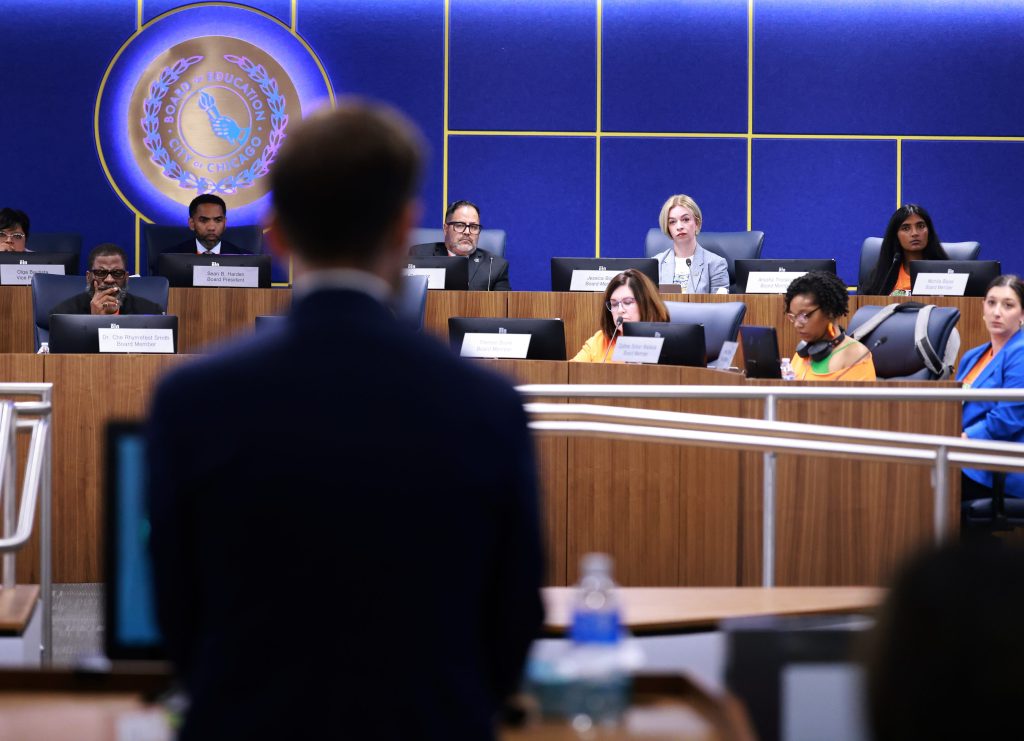Chicago Board of Education President Sean Harden challenged the district’s new proposed budget Tuesday, expressing doubts about its heavy reliance on revenue from special taxing districts to close a $734 million deficit.
The hesitancy repeatedly expressed by Harden, who was appointed by Mayor Brandon Johnson, during two public hearings, signals further growing tension within the school board over how to address the district’s deepening fiscal crisis.
Chicago Public Schools’ fiscal roadmap, backed by interim CEO Macquline King, runs counter to the agenda of Johnson, a former Chicago Teachers Union organizer, who has advocated both now and in the past for borrowing to address budget woes.
In the auditorium at CPS headquarters in the Loop Tuesday, the board’s divide over the budget — between elected and mayoral-appointed board members — was on full display. After parents, educators, local officials and advocates weighed in on how best to close the district’s budget gap, Harden led the discussion between passionate board members on both sides.
Debby Pope, a mayoral appointee representing District 2B on the North Side, raised concerns about relying on uncertain revenue projections.
“I am not an advocate of irresponsibility. However, I do think it is irresponsible to make assumptions about income, about money we will or won’t get in the future,” she said.
Other members expressed support.
“Balancing the budget on the backs of our children so that we can help out our mayor. That’s not our responsibility,” said Jennie Custer, who was elected and represents District 1B on the far Northwest Side.
Balancing the budget with tax increment financing
Among many avenues to shave and save money, the district’s new plan relies on $379 million from tax increment financing districts, or TIF, taxing districts drawn around the city that seek to spur redevelopment through local projects approved by Chicago’s Department of Planning and Development.
Every year, aldermen allocate extra money from their districts, in what is known as a TIF surplus. The city receives less than a quarter of that money, while CPS receives over half. Established under Mayor Harold Washington in 1984, the TIF system has, in the past, received criticism for its lack of transparency and for taking away money from taxing bodies like the school district.
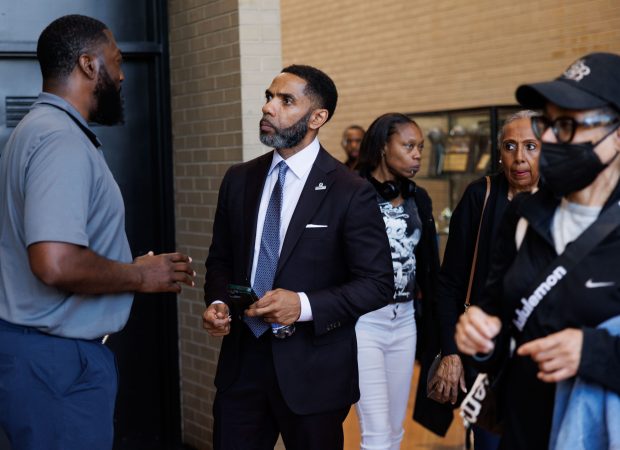 Chicago Public Schools board President Sean Harden, center, attends a community engagement session to discuss the Chicago Public Schools budget at Dyett High School on July 14, 2025, in Chicago. (Armando L. Sanchez/Chicago Tribune)
Chicago Public Schools board President Sean Harden, center, attends a community engagement session to discuss the Chicago Public Schools budget at Dyett High School on July 14, 2025, in Chicago. (Armando L. Sanchez/Chicago Tribune)
Mayor Johnson has promised to phase out the tax tool, but is also reliant on extra TIF funds to balance his razor-thin budget. Last year, the district received a record $300 million in TIF surplus from the city, and is planning to get $379 million this year, according to Sitkowski.
Harden pushed back on that notion Tuesday.
“It is my understanding that the city has moved away from using TIF surplus as a means of balancing the budget,” said Harden. “What happens in the event the TIF assumptions that we’re basing this budget on aren’t met, what’s our contingency?”
CPS Chief Budget Officer Mike Sitkowski said he knows relying on TIF isn’t a long-term solution, but reiterated that “it’s the best option that we have available.” He pointed to policies governing TIF surplus, explaining that the state TIF act and several city policies indicate the money is, indeed, there.
“Withholding TIF surplus funding from CPS would contradict established city policy or violate state law, and would hurt CPS students,” he said.
Several aldermen spoke in favor of the district’s budget proposal and underscored Sitkowski’s point.
“In order to solve our own budget, we need to take out a TIF surplus,” said Ald. Andre Vasquez, 40th. “Anyone who’s telling you that we’re going to withhold TIF is lying to you.”
The pension payment CTU once called ‘a despicable shell game’
Ultimately, the discussion around TIF is connected to two items that were markedly absent from the district’s budget proposal, which Sitkowski first presented at a board meeting last Wednesday: accepting $200 million in borrowing and covering a controversial $175 million pension payment to the city for municipal and nonteaching CPS employees.
Both measures were recently backed by Mayor Johnson, but rejected by interim CEO King, following the lead of her predecessor, Pedro Martinez, who left the district after a high-profile clash with the mayor over finances.
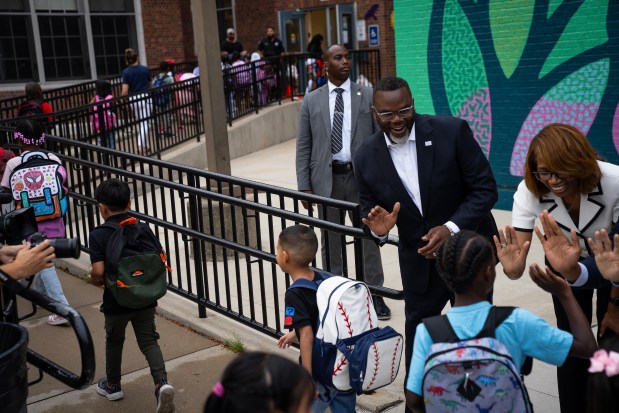 Mayor Brandon Johnson and interim CPS CEO Dr. Macquline King greet students at the Courtenay Language Arts Center in the Uptown neighborhood on the first day of school on Aug. 18, 2025. (E. Jason Wambsgans/Chicago Tribune)
Mayor Brandon Johnson and interim CPS CEO Dr. Macquline King greet students at the Courtenay Language Arts Center in the Uptown neighborhood on the first day of school on Aug. 18, 2025. (E. Jason Wambsgans/Chicago Tribune)
Whether CPS secures additional TIF funds will likely determine the fate of both the loan and pension payment. The proposed budget includes the potential for the district to make the pension payment, but it is dependent on whether CPS receives more funding, either from the city or state.
The city is legally obligated to make the pension payment. And for almost 100 years, the city did cover the payment to the pension, called the Municipal Employees’ Annuity & Benefit Fund of Chicago. Former Mayor Lori Lightfoot asked CPS to begin making payments in 2020, and the district used the flexibility provided by pandemic relief funds to help.
CTU at the time called the move “a despicable shell game” that “rips off CPS.” Johnson included not making the payments in his transition report, but, facing his own budget challenges, last year asked CPS to shoulder the cost. With pandemic funding expiring, then-CEO Martinez refused, and, at the last hour, City Hall absorbed the payment.
Last Wednesday, board members aligned with Johnson sent a letter to interim CEO King, urging her to revise the budget to include both the loan and the pension payment. Eleven members signed on — all but two, Jitu Brown and Ebony DeBerry, were appointed by the mayor. The letter was first reported by the Sun Times.
The liabilities of loans
On Tuesday, Sitkowski presented the same CPS budget plan as he did last week — with no pension payment and no borrowing — emphasizing its aim to minimize classroom cuts while working to keep future debt levels under control.
He reiterated that borrowing for operating expenses would send the district into a spiral of credit downgrades, pointing out that a decade ago, when the district previously borrowed continuously, CPS received 34 rating downgrades.
“We’ve lived through years of forced austerity, and this budget takes necessary steps to protect our schools from reliving this past,” he said.
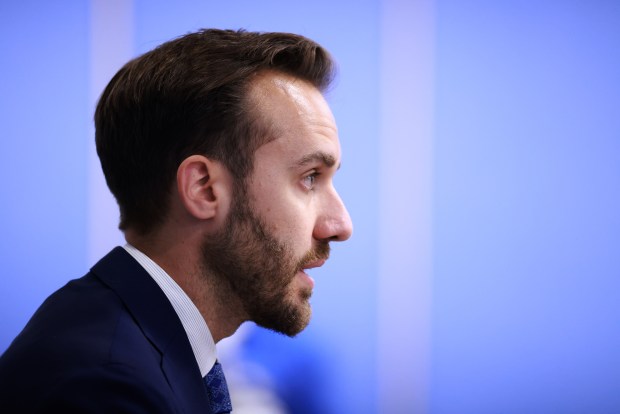 Chicago Public Schools Chief Budget Officer Michael Sitkowski speaks during a Board of Education meeting on Aug. 13, 2025. (Antonio Perez/Chicago Tribune)
Chicago Public Schools Chief Budget Officer Michael Sitkowski speaks during a Board of Education meeting on Aug. 13, 2025. (Antonio Perez/Chicago Tribune)
The district’s debt already stands at $9 billion, and CPS officials plan to refinance $1.8 billion of that prior debt, district officials said Tuesday.
Borrowing hundreds of millions would ultimately cost the district more because of interest on a loan, CPS Chief Financial Officer Miroslava Meija Krug said, similar to a mortgage on a house. She estimated a $200 million loan would balloon to $394 million over 15 years.
But board members, mostly those appointed by Johnson, were skeptical.
Board member Emma Lozano of District 7A on the Southwest Side, appointed by the mayor, said she refinanced her house as a single mom.
“I want everybody to remember when you have to take out a loan, all of us have done it, and we’ve paid it off, and sometimes there’s higher interest and less interest, but we figure it out,” she said. “This is an intelligent board, and we can figure it out.”
The board has repeatedly called for the city and state to step up to help CPS get through its dire fiscal predicament, through TIF, or expanded revenue tools such as a potential state sales tax on services like repairs.
Elected board member Jessica Biggs of District 6 on the South Side said the way the board acts now could affect the state’s willingness to collaborate on funding solutions.
“We’ve heard the state express that they really are interested in seeing some long-term reform before they come to the district’s aid,” she said.
‘We are the backbone of our schools’
This year’s budget crisis galvanized more parents into action, spurred in part by interim CEO King’s public engagement push. As King navigated mounting fiscal pressure and calls from the city to borrow money, she launched a series of community meetings aimed at bringing families into the conversation and the fight for funding. In those sessions, Chicagoans expressed a disinterest in borrowing.
CTU sang a different tune on Tuesday, lamenting cuts to schools and asking for more creative solutions to the budget woes. The district has already laid off hundreds of custodians, lunchroom staff, crossing guards, teachers and classroom support staff.
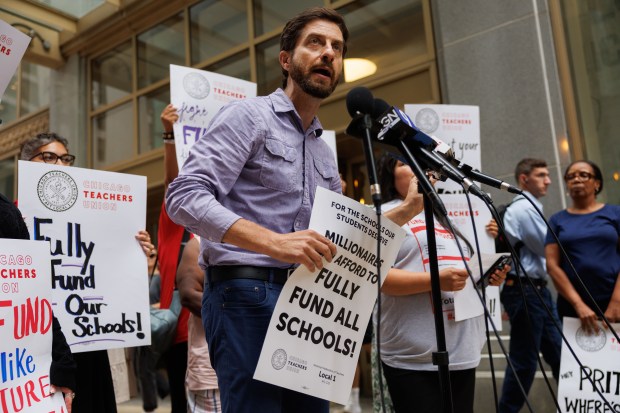 Chicago Teachers Union Vice President Jackson Potter speaks with members of the press outside Chicago Public Schools headquarters while CPS holds public budget hearings on Aug. 19, 2025. (Armando L. Sanchez/Chicago Tribune)
Chicago Teachers Union Vice President Jackson Potter speaks with members of the press outside Chicago Public Schools headquarters while CPS holds public budget hearings on Aug. 19, 2025. (Armando L. Sanchez/Chicago Tribune)
While the meeting went on inside CPS headquarters, the teacher union rallied outside, demanding a budget with firm financial solutions — not one based on “ifs,” paraprofessional Lashawn Wallace argued.
“We need guarantees. I need guarantees. I’ve worked in CPS classrooms for 32 years,” said Wallace. “We’re the ones who make children feel safe. We are the backbone of our schools.”
Keerti Nandan, a special education teacher at Sutherland Elementary, said ongoing uncertainty is straining already limited resources. She said her school is down five paraprofessionals.
“It’s only day two, and as a special education teacher, I can tell you that our paraprofessionals are already stretched to a breaking point,” she said. “(They’re) skipping their own lunches … just to keep things running.”
Nandan said wanting kids to have warmth, clean classrooms, safe drinking water and safe streets shouldn’t be too much.
Originally Published: August 20, 2025 at 11:40 AM CDT
